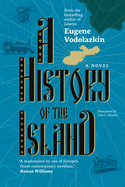
Telling a society's complete history is an ambitious undertaking for a novel, a form often obsessed with the individual and particular. But Eugene Vodolazkin (Solovyov and Larionov; Laurus), celebrated Russian novelist and medieval historian, does just that in A History of the Island. With the artful translation of Lisa C. Hayden, Vodolazkin tells an epic story with sweeping scope that never bypasses the granularity of human existence.
The history of the island--found on no map--is told from the perspective of monks whose divisions and characters from time to time take center stage. Additionally, the composition is overseen by a multicentenarian couple who are the island's former rulers and last surviving members of its aristocracy. The shifting points of view and the chroniclers' all-too-human sensibilities make them almost the main characters--and unreliable narrators--but the telling remains quiet and removed enough for the island's story to take center stage, and for it to seem like the truth.
It is a history from the beginning to the present. It is full of upheaval: laws, rulers, religions, ideologies, intellectual fashions, economic systems, and more are venerated, only to be cast aside. The outside world exists, but as another place, for the island is unavoidably apart. This is history as parable, told with an Old Testament sensibility that is punctuated with darts of irony, modern and postmodern. Its humor and light touch mask a withering critique of Western rationalism--which extends to idolization of any philosophy, theology, or social order claiming omniscience--while consistently decrying the catastrophe of all war. --Walker Minot, writer and editor

